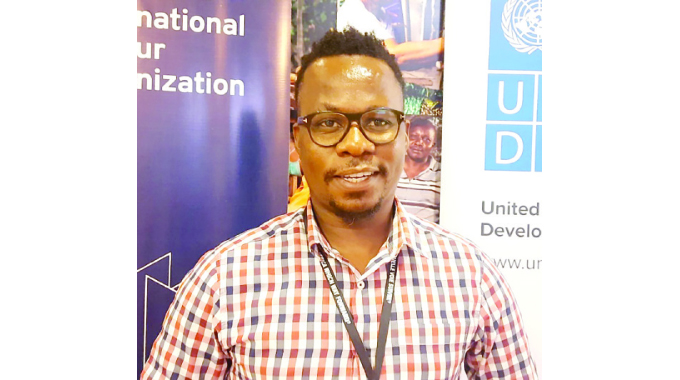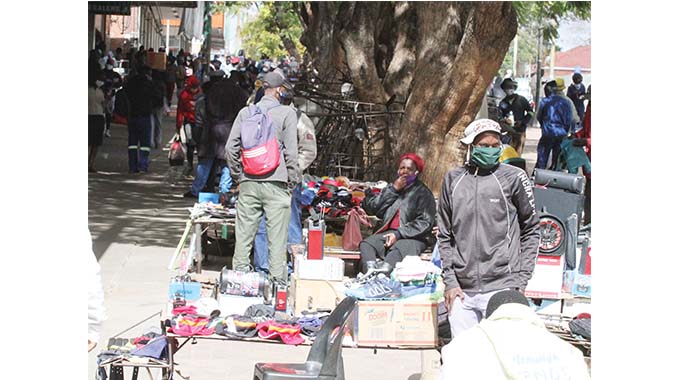‘Informal sector ready to transition to formal economy’

Leonard Ncube, Victoria Falls Reporter
THE Covid-19 pandemic was a wake-up call for governments in Southern Africa to realise the crucial role the informal sector can play in their economies.
An estimated 80 percent of the working population in Africa is employed in the informal sector with the Zimbabwean economy now 70% informal, according to the Employer’s Confederation of Zimbabwe (Emcoz).
Covid-19 compounded the situation and governments, including Zimbabwe’s, have started processes to formalise the informal economy to harness revenue opportunities in tax payment and service provision.

Zimbabwe Chamber of Informal Economy Association (ZCIEA) secretary general Mr Wisborn Malaya
However, there are concerns within the informal economy that formalising the sector might result in taxation without social services and safety nets in return, hence skepticism among some sections about joining the formal economy.
The African Union, in conjunction with Government of Zimbabwe and development partners International Labour Organisation and United Nations Development Programme, held a two-day policy dialogue on informal economy in Africa which ended in Victoria Falls on Wednesday with the aim of strategising on how to formalise the sector without leaving anyone behind.
During discussions, it was noted that among other things, lack of information and understanding of the formalisation process, disorganised operations, gaps in legislation, lack of inclusive planning, mistrust by governments and lack of capital are some of the challenges faced by the informal sector.
In separate interviews, representatives of the informal economy players from Sadc countries said they are ready to transition to formal economy as long as there is political will.
“There are common issues in terms of policy around transition and governments seem to be agreeing to formalise but are at different levels. Zimbabwe is at a stage of consultation while other countries haven’t started or have no laws to formalise.
“What is lacking is political will sometimes as we witness harassment of informal traders and confiscation of goods. There is also still an issue of value system in terms of seeing informal traders as human beings.

Informal Traders
As a sector we are ready to transform which is why we have been taking part in consultations by Government and we hope the lessons learnt through Covid-19 will guide the future as there is empirical evidence that 80 percent people are in the informal economy,” said Mr Michael Ndiweni, executive director of Bulawayo Vendors and Traders Association which has over 8 000 members countrywide.
Zimbabwe Chamber of Informal Economy Association (ZCIEA) secretary general Mr Wisborn Malaya said there has been political will to recognise the informal sector in terms of growth of the economy in Africa, enhancing decent work and taking away negative perception about the sector.
“In the Zimbabwe perspective, we have seen political will especially after Covid-19 with the agenda for formalisation of the informal economy whose players’ participation has been very significant,” said Mr Malaya. He said there is a need to harmonise strategies across Africa.
“Covid-19 badly affected the informal sector and some members failed to come back to business. The nature of business has also changed after lockdowns and we saw Government availing some funds, although some may not have met the criteria,” Mr Malaya said.
ZCIEA has more than 213 000 members. Ms Tebogo Serurubele from the Botswana Informal Sector Association said the informal economy was not significantly recognised until the pandemic.
“We are very ready as a sector of 79 000 members. In the past there was no support but after the outbreak of the pandemic, we are now part of the economy and government started to extend loans to informal sector player at low interest rates. Government now sees the informal sector as important,” she said.
Ms Kgomotso Nong from the Women Finance House of Botswana said there is a need to close the gap between the formal economy and the informal sector through financial inclusion.
Secretary general of the Namibia Informal Sector Organisation Mr Josef Veripi Kandenge said social dialogue between the private sector and government is crucial in formalisation of the informal economy.
He said Namibia had established an inter-ministerial platform to collaborate with other sectors. – @ncubeleon











Comments